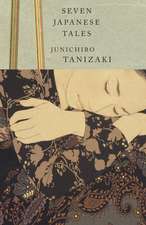The Makioka Sisters: Everyman's Library CLASSICS
Autor Jun'ichiro Tanizaki Traducere de Edward G. Seidenstickeren Limba Engleză Hardback – 20 mai 1993
| Toate formatele și edițiile | Preț | Express |
|---|---|---|
| Paperback (1) | 107.86 lei 3-5 săpt. | |
| Vintage Publishing – 31 aug 1995 | 107.86 lei 3-5 săpt. | |
| Hardback (1) | 110.63 lei 3-5 săpt. | +25.04 lei 10-14 zile |
| EVERYMAN – 20 mai 1993 | 110.63 lei 3-5 săpt. | +25.04 lei 10-14 zile |
Din seria Everyman's Library CLASSICS
- 13%
 Preț: 74.90 lei
Preț: 74.90 lei - 13%
 Preț: 62.73 lei
Preț: 62.73 lei - 13%
 Preț: 63.36 lei
Preț: 63.36 lei - 23%
 Preț: 102.65 lei
Preț: 102.65 lei - 13%
 Preț: 73.59 lei
Preț: 73.59 lei - 13%
 Preț: 85.11 lei
Preț: 85.11 lei - 11%
 Preț: 90.25 lei
Preț: 90.25 lei - 10%
 Preț: 85.75 lei
Preț: 85.75 lei - 12%
 Preț: 92.90 lei
Preț: 92.90 lei - 25%
 Preț: 158.17 lei
Preț: 158.17 lei - 14%
 Preț: 90.21 lei
Preț: 90.21 lei - 13%
 Preț: 74.80 lei
Preț: 74.80 lei - 12%
 Preț: 87.10 lei
Preț: 87.10 lei - 12%
 Preț: 75.39 lei
Preț: 75.39 lei - 13%
 Preț: 74.61 lei
Preț: 74.61 lei - 13%
 Preț: 97.36 lei
Preț: 97.36 lei - 12%
 Preț: 75.81 lei
Preț: 75.81 lei - 11%
 Preț: 89.68 lei
Preț: 89.68 lei - 13%
 Preț: 86.26 lei
Preț: 86.26 lei - 11%
 Preț: 112.93 lei
Preț: 112.93 lei - 11%
 Preț: 90.22 lei
Preț: 90.22 lei - 13%
 Preț: 74.71 lei
Preț: 74.71 lei - 12%
 Preț: 76.82 lei
Preț: 76.82 lei - 13%
 Preț: 68.30 lei
Preț: 68.30 lei - 17%
 Preț: 110.12 lei
Preț: 110.12 lei - 12%
 Preț: 76.74 lei
Preț: 76.74 lei - 14%
 Preț: 60.89 lei
Preț: 60.89 lei - 14%
 Preț: 83.48 lei
Preț: 83.48 lei - 12%
 Preț: 76.62 lei
Preț: 76.62 lei -
 Preț: 84.44 lei
Preț: 84.44 lei - 14%
 Preț: 73.53 lei
Preț: 73.53 lei - 12%
 Preț: 81.12 lei
Preț: 81.12 lei - 12%
 Preț: 87.77 lei
Preț: 87.77 lei - 15%
 Preț: 110.11 lei
Preț: 110.11 lei - 11%
 Preț: 90.41 lei
Preț: 90.41 lei - 13%
 Preț: 115.40 lei
Preț: 115.40 lei - 11%
 Preț: 89.81 lei
Preț: 89.81 lei -
 Preț: 109.75 lei
Preț: 109.75 lei - 13%
 Preț: 366.37 lei
Preț: 366.37 lei - 14%
 Preț: 62.03 lei
Preț: 62.03 lei - 24%
 Preț: 67.57 lei
Preț: 67.57 lei - 12%
 Preț: 111.39 lei
Preț: 111.39 lei - 14%
 Preț: 83.79 lei
Preț: 83.79 lei - 14%
 Preț: 84.70 lei
Preț: 84.70 lei - 12%
 Preț: 104.38 lei
Preț: 104.38 lei - 13%
 Preț: 114.51 lei
Preț: 114.51 lei - 14%
 Preț: 73.47 lei
Preț: 73.47 lei - 12%
 Preț: 88.02 lei
Preț: 88.02 lei - 14%
 Preț: 83.39 lei
Preț: 83.39 lei - 13%
 Preț: 63.22 lei
Preț: 63.22 lei
Preț: 110.63 lei
Nou
Puncte Express: 166
Preț estimativ în valută:
21.17€ • 21.97$ • 17.70£
21.17€ • 21.97$ • 17.70£
Carte disponibilă
Livrare economică 22 februarie-08 martie
Livrare express 11-15 februarie pentru 35.03 lei
Preluare comenzi: 021 569.72.76
Specificații
ISBN-13: 9781857151558
ISBN-10: 1857151550
Pagini: 512
Dimensiuni: 137 x 213 x 27 mm
Greutate: 0.61 kg
Editura: EVERYMAN
Seria Everyman's Library CLASSICS
ISBN-10: 1857151550
Pagini: 512
Dimensiuni: 137 x 213 x 27 mm
Greutate: 0.61 kg
Editura: EVERYMAN
Seria Everyman's Library CLASSICS
Notă biografică
Junichiro Tanizaki was born in Tokyo in 1886 and lived there until the earthquake of 1923, when he moved to the Kyoto-Osaka region, the scene of his novel The Makioka Sisters (1943-48). Among his works are Naomi (1924), Some Prefer Nettles (1928), Quicksand (1930), Arrowroot (1931), A Portrait of Shunkin (1933), The Secret History of the Lord of Musashi (1935), modern versions of The Tale of Genji (1941, 1954, and 1965), Captain Shigemoto's Mother (1949), The Key (1956), and Diary of a Mad Old Man (1961). By 1930 he had gained such renown that an edition of his complete works was published, and he was awarded Japan's Imperial Prize in Literature in 1949. Tanizaki died in 1965.
Recenzii
Praise for Junichiro Tanizaki's The Makioka Sisters
“A masterpiece of great beauty and quality.” –Chicago Tribune
“Skillfully and subtly, Tanizaki brushes in a delicate picture of a gentle world that no longer exists.” –San Francisco Chronicle
From the Hardcover edition.
“A masterpiece of great beauty and quality.” –Chicago Tribune
“Skillfully and subtly, Tanizaki brushes in a delicate picture of a gentle world that no longer exists.” –San Francisco Chronicle
From the Hardcover edition.













